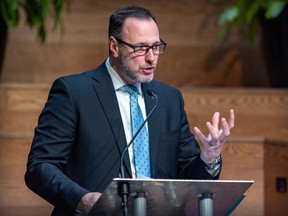In a replay of the 2019 debate on secularism at the National Assembly, experts and professors squared off Tuesday on the pros and cons of using the clause.

Article content
QUEBEC — With one expert saying reopening Quebec’s state secularism law would cause more grief than good, the minister responsible for Bill 21, Jean-François Roberge, insisted the law is fundamental to Quebec and requires the protection of the Constitution’s notwithstanding clause.
But following the Ligue des droits et libertés, which said Monday that Bill 21 discriminates, another constitutional expert, Université Laval’s Louis-Philippe Lampron, argued along the same lines, saying it is the prerogative of the majority to use its powers judiciously and not trample the rights of minorities.
Advertisement 2
Story continues below
Article content
Article content
It is the essence of democracy that there be a counterweight to power, which is usually the courts, Lampron said in a presentation Tuesday to the legislature committee examining Bill 52, which, when adopted, will renew the notwithstanding clause overriding fundamental rights for another five years.
In the case of Bill 21, the government’s use of the clause the day the law was adopted in 2019 has impeded dialogue from the get-go, which is not a normal state of affairs, he said.
“If we want rights and freedoms to have greater value than the paper they are written on, the government necessarily has to accept to have its hands tied on the effect of recognizing these rights,” Lampron told the committee.
“We can’t skip over them when it doesn’t suit us.”
His comments caused a stir among other constitutional experts and professors in the room who had already presented briefs arguing the other way: that Quebec has every right to make use of the clause to protect its legislative choices.
It remains necessary, Prof. Patrick Taillon, also from Université Laval, said because, for now, Bill 21 — which bars public servants in position of power from wearing religious symbols such as a crucifix, hijab or kippah on the job — risks being struck down even if the majority of Quebecers support it.
Article content
Advertisement 3
Story continues below
Article content
He floated the idea that as the mentality of judges evolves, such a legal shield might one day not be necessary, but not yet. Taking the opposite tact of Lampron, Taillon argued the clause gives legislators a counterweight to the courts.
“The clause allows us to send a signal,” Taillon said.
He also argued that after years of debate on secularism, Bill 21 has created a peaceful climate on the issue. Allowing the courts to strike down the law “would again plunge Quebec into a painful debate and weaken the consensus which has created the balance currently in place.”
Lasting one day, the hearings into the two-paragraph-long bill were a kind of replay of the year-long debate leading to the controversial adoption of Bill 21.
Among the players who were there then and again Tuesday was Université de Sherbrooke law professor Guillaume Rousseau, who helped draft parts of the original bill when secularism was the responsibility of a different minister, Simon Jolin-Barrette.
In his presentation, Rousseau tried to counter the widespread perception the clause is a bad thing, noting that in history Quebec has used it 41 times. He also commended the government’s rebranding of the clause in Bill 52 to call it the parliamentary sovereignty clause.
Advertisement 4
Story continues below
Article content
Another group, Droits Collectifs Québec, welcomed Bill 52 as a “legitimate and justified” tool for the National Assembly to use to protect the collective interests of Quebec.
In his opening comments to the committee, Roberge defended the bill, noting that while it is only a few paragraphs long it represents a significant step. The bill protects Bill 21, “which operationalizes and consolidates Quebec’s choices and vision of secularism,” he said.
“It squarely protects a law which is considered at several levels a fundamental law, a law which is quasi-constitutional,” he said.
But Lampron argued the other way, saying “it is uncontestable” that the minority’s religious rights took a hit with Bill 21 while the vast majority of Quebecers — Christian, atheist or agnostic — were obliged to make zero effort to comply with the laws.
Lampron said secularism in Quebec existed long before Bill 21. The only tangible effect the law has had is the ban on symbols for minorities.
twitter.com/philipauthier
Recommended from Editorial
Advertisement 5
Story continues below
Article content
Article content


Comments